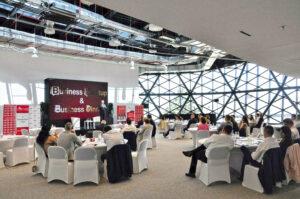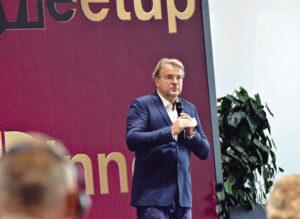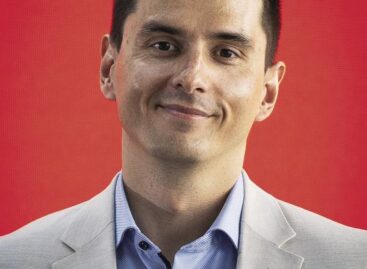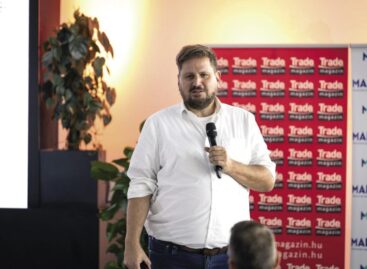Light at the end of the tunnel
We can finally see the light at the end of the tunnel, said Nenad Pacek, founder and president of Global Success Advisors and EMEA Business Group when talking about global economic trends at this year’s Business Meetup&Dinner event, which was organised by Trade magazin.

The Hungarian FMCG sector is well placed to manage potential disturbances and achieve success in the period ahead
This article is available for reading in Trade magazin 2024/8-9
Inflation and interest rates
Following a difficult period of double-digit inflation and great increases in producer prices, producer prices across Europe have recently reduced by more than 8%, including the Hungarian market, where we see a 3% decline at the moment. Nenad Pacek attributes this to several factors; firstly, the sharp rise in interest rates over the past 18 months has constrained global demand. Secondly, high inventory levels in various industries have significantly slowed down orders, which has prolonged the manufacturing recession in Europe. Inflation rates have decreased greatly in the major economies. In the euro area inflation plunged to 2.4% from more than 10%. This is a key trend for the FMCG sector, as it ends the need for continued price increases.

Strategic planning should also include emergency measures to deal with potential disturbances caused by geopolitical conflicts or financial market instability – Nenad Pacek, Founder and President of Global Success Advisors and EMEA Business Group told
Western and eastern economic outlook
Western Europe, especially Germany, is ahead of an economic upturn. Germany’s economic growth is expected to exceed 1% in the fourth quarter, thanks to lower gas and electricity prices and the end of the manufacturing recession. This recovery will be beneficial for Hungary due to the close supply chain links with Germany. In Western Europe a real economic boom is expected in the next 18 months. Nenad Pacek also highlighted the strong growth prospects for Central Asia. In Eastern Europe Poland is expected to lead the way in growth in the coming period. Hungary’s growth forecast is modest but positive, with projections above 2% this year and rising to 3% in 2025. The stability of the Hungarian forint is critical, and prudent management of interest rate cuts is needed to avoid a significant depreciation. Hungary’s foreign exchange reserves have been growing, which could serve as a shield against a potential economic shock. This improvement, coupled with cautious interest rate cuts, should help stabilise the Hungarian economy, thus fostering a more conducive environment for business growth in the FMCG sector.

Wherever we look in Western Europe, we can expect real recovery in the next 18 months, and that’s true for 2025 as a whole, too – good news for us and for all countries in the region
Risks and strategic considerations
Nenad Pacek highlighted several geopolitical risks that could influence the global economic scenario. The escalating cold war between the US and China poses significant long-term challenges. Companies that depend on Chinese supply chains should consider risk mitigation strategies to cope with potential disruptions. The Israeli-Gaza conflict and the ongoing Russia-Ukraine war represent additional risks. If the former escalates in the Middle East, the oil price will shoot up to USD 183 a barrel instead of the USD 83 as it was in May this year. Further sanctions against Russia could also cause disruptions in global trade and economic stability. Businesses should diversify their supply chains and explore new markets to avoid geopolitical and financial risks. Nenad Pacek encouraged companies to plan their budgets for the next 12-18 months with confidence. He underlined that the Hungarian FMCG sector is in a good place to manage potential disruptions well and be successful in the period ahead. //
Related news
China’s place in the global economy: the future isn’t “Made in China”
🎧 Hallgasd a cikket: Lejátszás Szünet Folytatás Leállítás Nyelv: Auto…
Read more >Business Meetup & Dinner: compass in a chaotic world
🎧 Hallgasd a cikket: Lejátszás Szünet Folytatás Leállítás Nyelv: Auto…
Read more >Related news
MOHU: 5,200 return points are in operation, but 47 larger settlements still do not have RE points – public “enema” machines may be introduced
🎧 Hallgasd a cikket: Lejátszás Szünet Folytatás Leállítás Nyelv: Auto…
Read more >KSH: in the fourth quarter of last year, investment performance was 1.3 percent lower than a year earlier
🎧 Hallgasd a cikket: Lejátszás Szünet Folytatás Leállítás Nyelv: Auto…
Read more >








